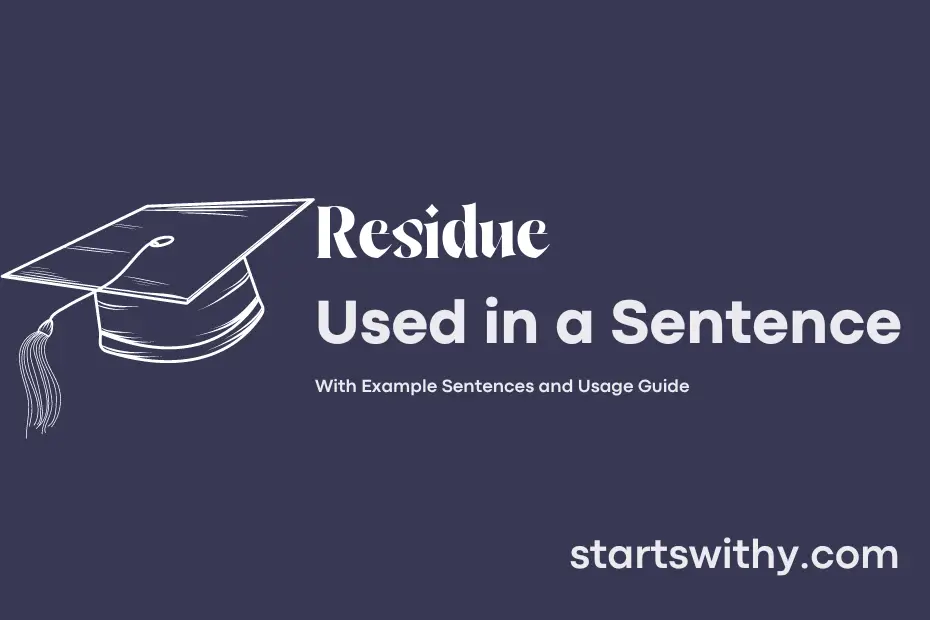Curious about the term “residue” and its significance in various contexts? Simply put, residue refers to the remaining or leftover material that remains after a process or event has taken place. This residual matter can come in different forms and play a crucial role in analyzing outcomes or understanding reactions.
Whether it’s the residue left behind in a chemistry experiment, the lingering effects of a past relationship, or the trace evidence at a crime scene, residue serves as a tangible reminder of what has occurred. Keep reading to explore how residue can provide valuable insights and shed light on the aftermath of different situations.
7 Examples Of Residue Used In a Sentence For Kids
- The residue of the cookie is on my fingers.
- I can see the residue of the paint on the paper.
- The residue of the chalk is on the blackboard.
- There is residue left after the water evaporated.
- The residue of the glue is on the table.
- I found residue on my shoes after playing outside.
- The residue of the soap is on my hands.
14 Sentences with Residue Examples
- Make sure to properly clean your beakers to remove any residue from the previous experiment.
- The lab instructor stressed the importance of not leaving any chemical residue on the glassware.
- Always wipe down the lab bench to ensure there is no residue left behind from experiments.
- It is important to wash your hands thoroughly after handling any residue in the lab.
- The residue left behind from the reaction could be seen at the bottom of the test tube.
- The students were instructed to wear gloves when working with materials that could leave residue on their hands.
- Check the equipment for any residue before starting the experiment.
- The lab technician used a special solvent to clean up the stubborn residue on the glassware.
- The chromatography paper showed distinct bands of colorful residue from the mixture.
- Use a clean brush to remove any residue from the fume hood before using it.
- The student noticed a white powdery residue left behind after evaporating the solution.
- Dispose of any chemical residue in the designated waste bin.
- The residue left on the Petri dish indicated the growth of bacteria.
- Spray the surface with a mild detergent to remove any residue from spilled chemicals.
How To Use Residue in Sentences?
When incorporating the Residue in a sentence, it is important to understand its meaning and usage. Residue refers to the remaining part or trace left behind after the main part has been removed, taken away, or used.
Here are some tips on how to use Residue effectively in a sentence:
- Identify the Residue in a situation or context where something has been removed, and a small amount is left behind.
- Place the Residue in a sentence after the primary action or event has occurred, to describe what remains.
- Use Residue to emphasize the leftover portion that may have significance or impact.
Example sentences:
- After cleaning the kitchen counter, there was a sticky residue left from the spilled juice.
- The residue of the ancient civilization can still be seen in the ruins that dot the landscape.
- Even after washing my car, a thin layer of dust residue settled on the hood overnight.
By following these guidelines, you can effectively incorporate Residue into your writing to add depth and detail to your descriptions. Experiment with different sentence structures and contexts to enhance your understanding and usage of the word.
Conclusion
In conclusion, sentences with residue often refer to the remnants or traces left behind after an event or process. These sentences can be found in various contexts, such as in science, chemistry, mathematics, and even in everyday conversations. The term “residue” conveys the idea of what is left over or what remains after the main part has been removed or completed.
By examining sentences with residue, we can gain a better understanding of how this concept is used and its significance in different fields. It serves as a reminder of what is left behind and highlights the importance of what remains after something has been taken away or completed. Overall, sentences with residue provide insight into the idea of remnants or traces, enriching our understanding of various subjects.



